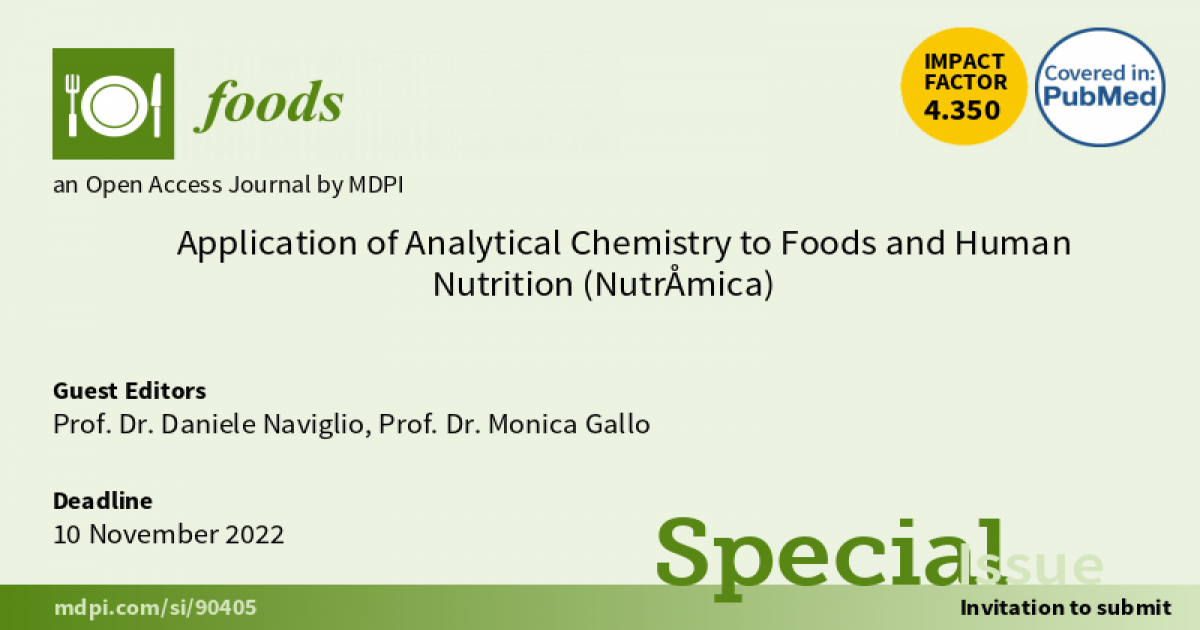Application of Analytical Chemistry to Foods and Human Nutrition (NutrÅmica)
A special issue of Foods (ISSN 2304-8158). This special issue belongs to the section "Food Analytical Methods".
Deadline for manuscript submissions: closed (10 November 2022) | Viewed by 25016

Special Issue Editors
Interests: gas chromatography; HPLC; lipids; butter; oils; solid-liquid extraction; food and beverages; saffron; food; supplements
Special Issues, Collections and Topics in MDPI journals
Interests: analytical techniques (HPLC; GC-MS; LC-MS; NMR); antioxidants; beneficial effects; bioactive compounds; extraction techniques; food and health; food and nutrition
Special Issues, Collections and Topics in MDPI journals
Special Issue Information
Dear Colleagues,
Two centuries ago, the application of Analytical Chemistry to the study of food composition gave life to a new science named “Bromatology” (from the Greek βρῶμα, brṑma, "food"). This science can be considered a branch of chemistry that deals with the study of foods, emphasizing the aspects related to the qualitative and quantitative characterization of its components (lipids, proteins, carbohydrates, etc.) and is now referred to as food chemistry. This new science studies the chemical composition of foods and the properties of their constituents, which contribute to defining their nutritional and product value.
In recent decades, studies dealing with human nutrition have increased because many processes of transformation of the main components of foods (carbohydrates, lipids and proteins) are not completely known, and so, more experiments and research are needed to clarify, for example, the conversion of nutrients into calories and energy. Moreover, the effect of unbalance of some important minerals such as sodium and potassium is not completely clear, and initial research has indicated that these minerals may be linked to diseases such as Alzheimer’s. The philosopher Ludwig Feuerbach in 1862 expressed his thoughts in the famous maxim: “Man is what he eats”. He anticipated many scientific concepts linked to the importance of food in human nutrition: “Food theory is of great ethical and political importance. Food turns into blood, blood into heart and brain; in matters of thoughts and feelings. Human food is the foundation of culture and sentiment. If you want to make the people better, instead of declamations against sin, give them better nutrition.” These concepts are very topical today, and as consequence of research in human nutrition, we are approaching the concept of personalized nutrition; this means that science needs tools to establish the percentage of carbohydrates, lipids, proteins, and minerals that a single person needs, and so, analytical chemistry can offer the right approach to solving these problems. With these concepts in mind, we invite all scientists and researchers working in this field named NutrÅmica (nutrition and chemistry linked by Å for Angstrom) to submit scientific articles in which analytical chemistry is applied to the analysis of foods and/or to the study of foods in human nutrition.
Prof. Dr. Daniele Naviglio
Prof. Dr. Monica Gallo
Guest Editors
Manuscript Submission Information
Manuscripts should be submitted online at www.mdpi.com by registering and logging in to this website. Once you are registered, click here to go to the submission form. Manuscripts can be submitted until the deadline. All submissions that pass pre-check are peer-reviewed. Accepted papers will be published continuously in the journal (as soon as accepted) and will be listed together on the special issue website. Research articles, review articles as well as short communications are invited. For planned papers, a title and short abstract (about 100 words) can be sent to the Editorial Office for announcement on this website.
Submitted manuscripts should not have been published previously, nor be under consideration for publication elsewhere (except conference proceedings papers). All manuscripts are thoroughly refereed through a single-blind peer-review process. A guide for authors and other relevant information for submission of manuscripts is available on the Instructions for Authors page. Foods is an international peer-reviewed open access semimonthly journal published by MDPI.
Please visit the Instructions for Authors page before submitting a manuscript. The Article Processing Charge (APC) for publication in this open access journal is 2900 CHF (Swiss Francs). Submitted papers should be well formatted and use good English. Authors may use MDPI's English editing service prior to publication or during author revisions.
Keywords
- carbohydrates
- lipids
- proteins
- human nutrition
- analytical chemistry
- metabolism
- calories
- food quality
- minerals
- personalized nutrition
- omics sciences
- extractive techniques
- therapeutic properties
Benefits of Publishing in a Special Issue
- Ease of navigation: Grouping papers by topic helps scholars navigate broad scope journals more efficiently.
- Greater discoverability: Special Issues support the reach and impact of scientific research. Articles in Special Issues are more discoverable and cited more frequently.
- Expansion of research network: Special Issues facilitate connections among authors, fostering scientific collaborations.
- External promotion: Articles in Special Issues are often promoted through the journal's social media, increasing their visibility.
- e-Book format: Special Issues with more than 10 articles can be published as dedicated e-books, ensuring wide and rapid dissemination.
Further information on MDPI's Special Issue polices can be found here.







